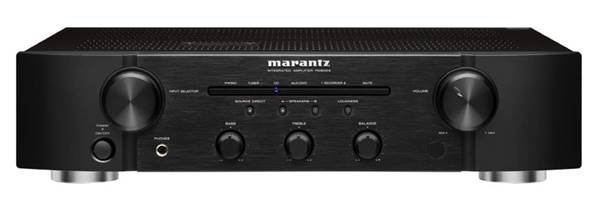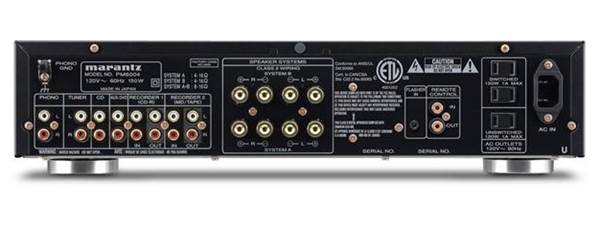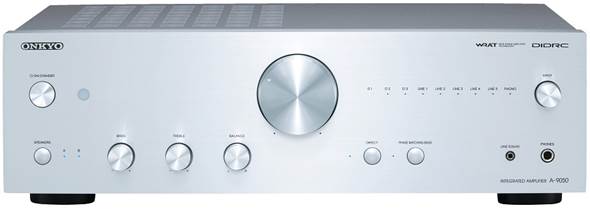Marantz PM6004: $716
What can we say about the Marantz PM6004
that we haven’t already? It ran away with our Product of the Year gong at the
2011 Awards and, a year on; it’s still a wonderful listen.
There’s a modest-sounding 45W of power per
channel, but don’t be fooled by that – the PM6004 is never found wanting in
terms of scale and power, sounding as poised and compelling as it did the first
time we heard it. Detail levels are high, with confident dynamics that soar and
weave through any track. It’s not a fussy performer, either: it’s easily
partnered with other kit and is happy with all kinds of music.

Marantz
PM6004
While amplifiers from the likes of Denon
charge through a track with all the energy they can muster, the Marantz takes
its time to coax out all the nuances of detail in voices, instruments and
rhythm. And despite its rather civilized touch, there’s no hint of sluggishness
– it effortlessly displays a nimble and punchy sense of timing that keeps the
rhythm of any song style fresh and engaging.
It takes great skill to deliver both
Eminem’s spitting rage and Norah Jones’s wistful vocals, and the Marantz has
the deftness to do it
It takes a great deal of skill to deliver
both Eminem’s spitting rage in The Way I Am and Norah Jones’s languid and
wistful vocals on Come Away With Me, and the Marantz has the right amount of
balance and deftness to pull off both. There’s no putting off the looming
comparison between the Marantz and the Rotel RA-10. The Rotel amplifier did
knock the Marantz off its perch to claim top spot in our 2012 Awards, but only
because it edges it when it comes to transparency, dynamic expression and
punch. In each case it’s by small margins, though.
And you’re sorted, whether you play music
from a CD player, streamer, or turntable – there are ample inputs and
connections on the rear panel for multiple analogue sources.
Flexibility and ease of use
Along with the five line-level inputs,
there’s a 3.5mm auxiliary input for portable players, a headphone output, and
the option to switch between two sets of speaker terminals.
As with the Denon stereo amplifier, we’d
highly recommend pressing the Source Direct button for a more robust sound that
bypasses the tonal controls. As for the amplifier itself, it’s sturdy and
solidly built, with controls and a remote control handset that are easy to live
with.
As we’ve noted previously, the PM6004 is
tuned to complement the Marantz CD6004 CD player, but the unfussy nature of the
stereo amplifier means that it will partner easily with most hi-fi separates.

Along
with the five line-level inputs, there’s a 3.5mm auxiliary input for portable
players, a headphone output, and the option to switch between two sets of speaker
terminals
This is a former Product of the Year at our
awards, which makes it all the more attractive in such a competitive market.
Its engaging performance means it most definitely keeps its five-star rating
(despite stiff competition), and it certainly remains one of our favorite
stereo amplifiers at this level.
Perfect partner
Pair up this Marantz amp with its matching
CD player, the Marantz CD6004, for a splendid balance. It’s a dream-team that
includes fast-paced and detailed dynamics in its list of major achievements.
Not only do the two units complement each other with similar build and finish,
there’s also a common remote to make your life easier.
Rating: 5/5
For: Subtle detail and dynamics; composed
and elegant presentation; build quality; price
Against: Just a shade soft and smoothed out
– could do with a touch more transparency
Verdict: The PM6004 is a firm favorite that
still delivers a thoroughly engaging listen
Onkyo A-9050: $575
Onkyo’s new range of integrated stereo
amplifiers grabbed our attention during consumer electronics show IFA 2012, the
entry-level A-9030 impressing us with its lively, enthusiastic presentation.
The A-9050 is that unit’s big brother, and
sonically it’s a different proposition. Hi-fi kit in the same range tends to
share familial traits – the sound tends to get more revealing and inherit more
layers of detail as you go up the range, but the sonic character usually
remains consistent. The two Onkyos, though, have gone in different directions.
Where the A-9030 sounds warm and comfortable, the A-9050 has a much thinner and
more brittle sound.

Onkyo
A-9050
More weight, please
The thin sound makes the A-9050 feel a
touch Anaemic compared with the more robust A-9030. Its soundstage also seems
modest when put next to the likes of the Rotel and Marantz amps in this test.
With a lack of weight to the overall sound, there’s a shortage of punch and
richness that doesn’t fully engage the listener in the way that made the A-9030
so appealing to listen to. This aspect is most revealing when playing a
turntable using the phono input – spin Dusty Springfield’s Spooky, and the
sound is much less involving than the other amplifiers in this test, robbing
songs of the usual mellow and warm glow we tend to associate with vinyl
records.
That said, while the Onkyo is not the
smoothest and easiest listen, it’s not without its merits. The A-9050 is fairly
well-balanced across the frequencies and has a decent helping of detail on
board that makes you keep on listening.
It has a gentle and deft touch when
it comes to dynamic shifts, being more pliable than the stubborn-sounding Denon
PMA-720AE
It may not have the layers of insight and
composure needed to win this test, but its clean and assured sound and good
grasp of timing does make it more listenable than the Denon amp. Play The
Social Network soundtrack, and you’ll find that it has a more tightly
controlled bass that gives it an edge over its in-house competitor, the A-9030.
It has a gentle and deft touch when it comes to dynamic shifts, too, being more
pliable than the stubborn-sounding Denon PMA-720AE in this test.
A step up from the A-9030 means an
increased power output of 75W per channel, along with digital inputs (one
optical, two coaxial) linked to an integrated Wolfson 192kH/24- bit DAC. Stream
music directly from a computer, or connect to a streamer using a digital
connection and you’ll find the DAC has a similarly thin, hard sound.
The A-9050 itself is a solid piece of kit
and looks good finished in either silver or black. It offers plenty of
connectivity with five analogue inputs alongside the aforementioned
moving-magnet phono input. It also has analogue, subwoofer and headphone
outputs, and two sets of speaker terminals.

A
step up from the A-9030 means an increased power output of 75W per channel,
along with digital inputs (one optical, two coaxial) linked to an integrated
Wolfson 192kH/24- bit DAC
This Onkyo faces stiff competition from rivals.
It has plenty going for it, but it needs to be more rounded to seriously worry
the class leaders.
Speaker matching
The Onkyo’s lean sound means some care must
be taken when partnering it with speakers. We’d avoid anything that makes it
sound too harsh or clinical, so we’d steer clear of the Monitor Audio BX2s and
even the Wharfedale Diamond 121s. Instead, we’d go for the more refined sound
of the Q Acoustics 2020i standmounters.
Rating: 4/5
For: Good detail; handles dynamics well;
good build and spec list
Against: Lean sound could be warmer and
richer; not the most engaging listen
Verdict: The lean presentation means it’s
not as involving as some, but there’s plenty to like